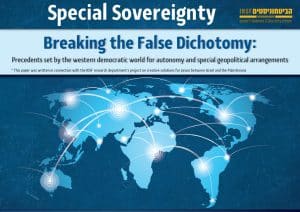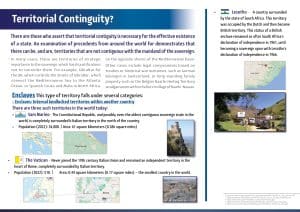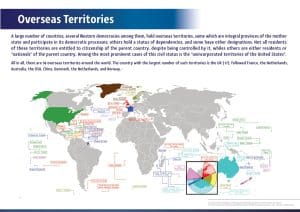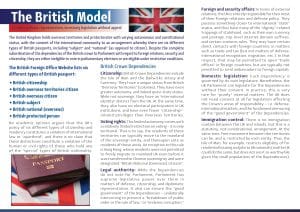Either full Annexation or “Occupation”? International Examples Establish the Precedent of Special Sovereignty
Breaking the False Dichotomy: Precedents set by the western democratic world for autonomy and special geopolitical arrangements

Notwithstanding the fervent discourse concerning the future of Israel’s control of the territories of Judea and Samaria (“West Bank”), a more nuanced assessment reveals that much of the passionate dispute is in regards to the specific details rather than the substantive position. On the one hand, the more conservative wing of the Israeli political map does not propose full sovereignty in all of Judea and Samaria – plans promoted by right-wing political actors typically call for the establishment of some form of Palestinian entity (a state, autonomy, self-rule, etc.) in at least some portion of Judea and Samaria. At the same time, the left wing of the Israeli political map does not support a full withdrawal to the 1949 armistice lines – most plans supported by left-wing actors recognize the need retail Israeli control of the Jordan Valley, Israeli sovereignty in the major Jewish settlement blocs, and effective demilitarization of the Palestinian entity. In any case, there is a broad consensus that a creative middle-ground solution is the practical approach to this issue, so that the arrangement assures the national security of Israel and considers the needs of the Palestinians to the maximum possible extent.
However, in spite of the broad agreement that out-of-the-box thinking will be necessary for any reasonable solution, to the best of our knowledge there has not yet been a comprehensive study that reviews the precedents around the world of territories that have a special sovereign status. Given that any Palestinian entity that will be established (if at all) would have to have certain elements of special (or limited) sovereignty, it would be wise to learn from other cases which implemented an arrangement of special sovereignty in order to address a unique geopolitical situation.
The study before you presents over 60 of the worldwide models that are governed as dependencies or areas of special sovereignty. These unique diplomatic arrangements reflect the aim of the sovereign country to safeguard its own interests through a form of limited control over the foreign affairs, security, and immigration policy of the given territory while allowing for a high measure of freedom in the governance of internal civil affairs, with the consent of the international community and completely within the scope of international law.
None of the following precedents should be viewed as entirely analogous to the Israeli-Palestinian context and none of the solutions should be viewed as applicable in their entirety, even with minor adjustments, to the Israeli reality. Every special arrangement is unique and is a product of its own particular circumstances. Still, we believe that acquaintance with these special cases will encourage the creative thinking that is necessary for the implantation of a workable solution to the challenge presented by Israel’s presence in the territories.
The study expands on three particular models: the Dutch model, the American model and the British model. Thus, for example, the Netherlands holds no less than six territories in the Caribbean, each with its own status, and none of which has the freedom to manage its own affairs in foreign policy, security and immigration. Neither do any of their respective peoples have the automatic right to immigrate to the European Netherlands despite the fact that they are subject to the decisions of the Dutch parliament and crown with respect to these matters. The US holds unincorporated territories, whose residents are not eligible to vote in the US presidential elections or for automatic US citizenship – this despite the fact that they pay taxes, may serve in the US military and are subject to the authority of Congress and the President. The UK rules territories and colonies whose peoples are not eligible to vote in the UK elections or make decisions on matters of foreign policy, security and immigration, although they are subject to the decisions of Parliament and crown. Consequently, there are six different types of British citizenship, among them “British subject”, “British national” and “British protected person”. All of this is endorsed by the international community and is fully in accordance with international law.
The State of Israel is not a carbon copy of the United States, the UK, or the Netherlands. It is governed by a unique form of democracy, the foundation of which is the aim to guarantee a national home for the Jewish people with certain laws and policies that are designed to safeguard the principle of Jewish independence. The models presented herein are mostly (with the notable exception of Hong Kong) vestiges of colonialism and do not reflect the deep and undeniable connection between the Jewish people and the Land of Israel, as opposed to Americans in Samoa or Dutch in Curacao. Further, none of the territories presented herein are governed by radical ideological movements sworn to wage ongoing, uncompromising war, on the sovereign country. As such, this paper does not propose to adopt one model or another outright, but rather learn from each model and use the concepts as a springboard for a more productive, creative conversation.
This paper takes a trip around the world and asks a basic question – what is special sovereignty?
Review of “Special Sovereignty”
- A Trip Around the World: Examples of Special Territories
- 66 special territories around the world: not every territory on the map is an independent state.
- Disputed territories throughout the world, where there is no demand for full independence.
- Territories without territorial contiguity – enclaved states, exclaves, non-contiguous territories, overseas territories: not every political entity exists within a single and contiguous territory.
- Three central models: The Dutch, US and UK models
- The Dutch model
- The American model
- The British model
Read the full PDF



